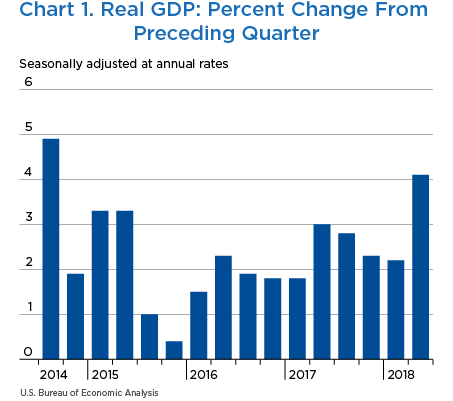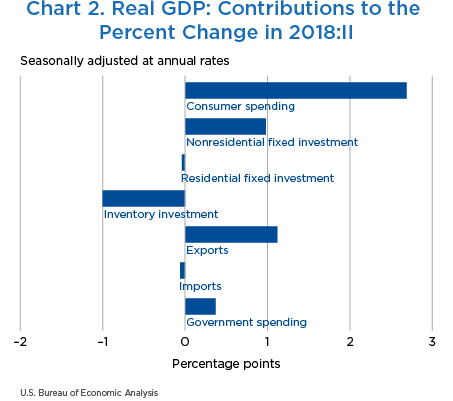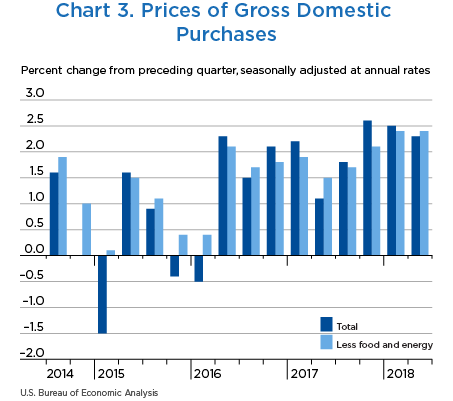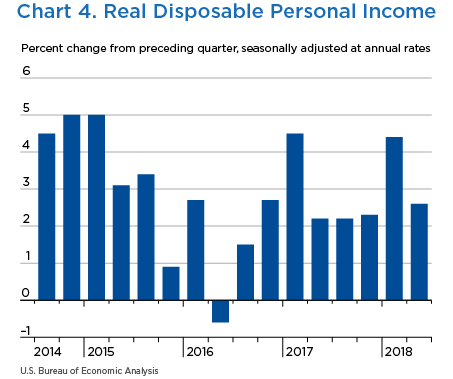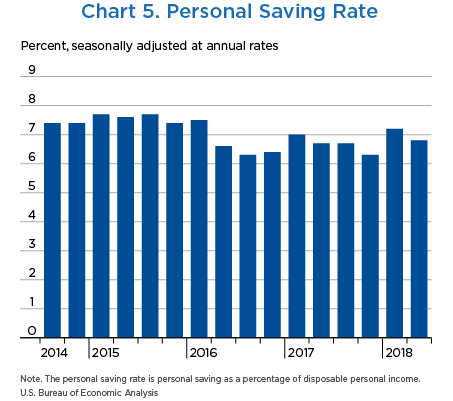GDP and the Economy
Advance Estimates for the Second Quarter of 2018
Real gross domestic product (GDP) increased at an annual rate of 4.1 percent in the second quarter of 2018, according to the advance estimates of the National Income and Product Accounts (NIPAs) (chart 1 and table 1).1 In the first quarter, real GDP increased 2.2 percent (revised).
Estimates for 1929 through the first quarter of 2018 have been updated based on the results of the 15th comprehensive update of the NIPAs. For more information, see the 2018 Comprehensive Update on BEA's website.
The increase in real GDP in the second quarter reflected positive contributions from consumer spending, exports, nonresidential fixed investment, federal government spending, and state and local government spending. These contributions were partly offset by negative contributions from private inventory investment and residential fixed investment.2 Imports, which are a subtraction in the calculation of GDP, increased (chart 2).
The acceleration in real GDP growth in the second quarter reflected accelerations in consumer spending and in exports, a smaller decrease in residential fixed investment, and accelerations in federal government spending and in state and local government spending. These movements were partly offset by a downturn in private inventory investment and a deceleration in nonresidential fixed investment. Imports decelerated.
- The acceleration in consumer spending (line 2) reflected an upturn in spending on goods and an acceleration in spending on services.
- The upturn in goods (line 3) reflected an upturn in durable goods (mainly motor vehicles and parts) and an acceleration in nondurable goods (mainly due to an upturn in clothing and footwear).
- The main contributors to the acceleration in services (line 6) were health care, housing and utilities, and food services and accommodations.
- The deceleration in nonresidential fixed investment (line 9) reflected decelerations in equipment (mainly due to downturns in transportation equipment and in industrial equipment) and intellectual property products (mainly software).
- The downturn in private inventory investment (line 14) mainly reflected a downturn in wholesale trade industries (primarily nondurable goods).
- The acceleration in exports (line 16) reflected an acceleration in exports of goods that was partly offset by a small deceleration in exports of services.
- The acceleration in exports of goods (line 17) reflected an acceleration in nondurable goods that was partly offset by a downturn in durable goods. The main contributors to the acceleration in exports of nondurable goods were an acceleration in foods, feeds, and beverages (notably, soybeans) and an upturn in petroleum and products.
| Line | Share of current-dollar GDP (percent) | Change from preceding period (percent) | Contribution to percent change in real GDP (percentage points) | ||||||||
|---|---|---|---|---|---|---|---|---|---|---|---|
| 2018 | 2017 | 2018 | 2017 | 2018 | |||||||
| II | III | IV | I | II | III | IV | I | II | |||
| 1 | Gross domestic product1 | 100.0 | 2.8 | 2.3 | 2.2 | 4.1 | 2.8 | 2.3 | 2.2 | 4.1 | |
| 2 | Personal consumption expenditures | 69.0 | 2.2 | 3.9 | 0.5 | 4.0 | 1.52 | 2.64 | 0.36 | 2.69 | |
| 3 | Goods | 22.1 | 4.1 | 6.8 | −0.6 | 5.9 | 0.86 | 1.42 | −0.13 | 1.24 | |
| 4 | Durable goods | 7.5 | 7.7 | 12.7 | −2.0 | 9.3 | 0.54 | 0.87 | −0.15 | 0.64 | |
| 5 | Nondurable goods | 14.6 | 2.3 | 4.0 | 0.1 | 4.2 | 0.32 | 0.55 | 0.02 | 0.59 | |
| 6 | Services | 46.9 | 1.4 | 2.6 | 1.0 | 3.1 | 0.65 | 1.22 | 0.49 | 1.46 | |
| 7 | Gross private domestic investment | 16.9 | 8.8 | 0.8 | 9.6 | −0.5 | 1.47 | 0.14 | 1.61 | −0.06 | |
| 8 | Fixed investment | 16.7 | 2.6 | 6.2 | 8.0 | 5.4 | 0.44 | 1.04 | 1.34 | 0.94 | |
| 9 | Nonresidential | 12.8 | 3.4 | 4.8 | 11.5 | 7.3 | 0.45 | 0.63 | 1.47 | 0.98 | |
| 10 | Structures | 3.0 | −5.7 | 1.3 | 13.9 | 13.3 | −0.18 | 0.04 | 0.40 | 0.39 | |
| 11 | Equipment | 5.8 | 9.8 | 9.9 | 8.5 | 3.9 | 0.56 | 0.56 | 0.49 | 0.23 | |
| 12 | Intellectual property products | 4.1 | 1.7 | 0.7 | 14.1 | 8.2 | 0.08 | 0.03 | 0.58 | 0.35 | |
| 13 | Residential | 3.9 | −0.5 | 11.1 | −3.4 | −1.1 | −0.02 | 0.41 | −0.14 | −0.04 | |
| 14 | Change in private inventories | 0.2 | ...... | ...... | ...... | ...... | 1.04 | −0.91 | 0.27 | −1.00 | |
| 15 | Net exports of goods and services | −3.2 | ...... | ...... | ...... | ...... | 0.01 | −0.89 | −0.02 | 1.06 | |
| 16 | Exports | 12.4 | 3.5 | 6.6 | 3.6 | 9.3 | 0.42 | 0.79 | 0.43 | 1.12 | |
| 17 | Goods | 8.3 | 2.1 | 10.9 | 3.2 | 13.3 | 0.17 | 0.83 | 0.26 | 1.04 | |
| 18 | Services | 4.1 | 6.3 | −1.0 | 4.2 | 1.9 | 0.25 | −0.04 | 0.18 | 0.08 | |
| 19 | Imports | 15.6 | 2.8 | 11.8 | 3.0 | 0.5 | −0.41 | −1.68 | −0.45 | −0.06 | |
| 20 | Goods | 12.8 | 2.5 | 14.2 | 2.4 | 1.0 | −0.29 | −1.62 | −0.30 | −0.12 | |
| 21 | Services | 2.8 | 4.4 | 2.0 | 5.5 | −1.9 | −0.12 | −0.06 | −0.15 | 0.05 | |
| 22 | Government consumption expenditures and gross investment | 17.2 | −1.0 | 2.4 | 1.5 | 2.1 | −0.18 | 0.41 | 0.27 | 0.37 | |
| 23 | Federal | 6.5 | −1.3 | 4.1 | 2.6 | 3.5 | −0.08 | 0.26 | 0.17 | 0.22 | |
| 24 | National defense | 3.9 | −2.9 | 2.9 | 3.0 | 5.5 | −0.11 | 0.11 | 0.11 | 0.21 | |
| 25 | Nondefense | 2.6 | 1.1 | 5.7 | 2.1 | 0.6 | 0.03 | 0.15 | 0.06 | 0.02 | |
| 26 | State and local | 10.8 | −0.9 | 1.4 | 0.9 | 1.4 | −0.10 | 0.15 | 0.10 | 0.15 | |
| Addenda: | |||||||||||
| 27 | Gross domestic income (GDI)2 | ...... | 2.3 | 2.4 | 0.9 | ...... | ...... | ...... | ...... | ...... | |
| 28 | Average of GDP and GDI | ...... | 2.7 | 2.8 | 1.9 | ...... | ...... | ...... | ...... | ...... | |
| 29 | Final sales of domestic product | 99.8 | 1.8 | 3.2 | 1.9 | 5.1 | 1.79 | 3.20 | 1.94 | 5.06 | |
| 30 | Goods | 29.4 | 8.4 | 1.1 | 4.1 | 6.2 | 2.40 | 0.34 | 1.20 | 1.81 | |
| 31 | Services | 62.3 | 1.2 | 2.1 | 1.2 | 3.0 | 0.74 | 1.32 | 0.73 | 1.85 | |
| 32 | Structures | 8.3 | −3.7 | 7.9 | 3.4 | 4.7 | −0.32 | 0.64 | 0.28 | 0.39 | |
| 33 | Motor vehicle output | 2.8 | −3.8 | 23.2 | 9.5 | −7.6 | −0.10 | 0.58 | 0.26 | −0.22 | |
| 34 | GDP excluding motor vehicle output | 97.2 | 3.0 | 1.8 | 2.0 | 4.4 | 2.93 | 1.72 | 1.96 | 4.28 | |
- The GDP estimates under the contribution columns are also percent changes.
- GDI is deflated by the implicit price deflator for GDP.
Note. Percent changes are from NIPA tables 1.1.1 and 1.2.1, contributions are from NIPA tables 1.1.2 and 1.2.2, and shares are from NIPA table 1.1.10 or are calculated from NIPA table 1.2.5.
Prices for gross domestic purchases, goods and services purchased by U.S. residents, increased 2.3 percent in the second quarter of 2018 after increasing 2.5 percent in the first quarter (table 2, line 1, and chart 3). The deceleration mainly reflected a deceleration in the prices paid for consumer nondurable goods (line 5).
- The main contributors to the deceleration in consumer nondurable goods prices were gasoline and other energy goods as well as clothing and footwear.
- Consumer prices excluding food and energy (line 25), a measure of the “core” rate of inflation, decelerated, increasing 2.0 percent in the second quarter after increasing 2.2 percent in the first quarter.
| Line | Change from preceding period (percent) | Contribution to percent change in gross domestic purchases prices (percentage points) | |||||||||
|---|---|---|---|---|---|---|---|---|---|---|---|
| 2017 | 2018 | 2017 | 2018 | ||||||||
| III | IV | I | II | III | IV | I | II | ||||
| 1 | Gross domestic purchases1 | 1.8 | 2.6 | 2.5 | 2.3 | 1.8 | 2.6 | 2.5 | 2.3 | ||
| 2 | Personal consumption expenditures | 1.6 | 2.7 | 2.5 | 1.8 | 1.06 | 1.81 | 1.63 | 1.23 | ||
| 3 | Goods | 0.7 | 1.5 | 2.2 | 0.4 | 0.14 | 0.30 | 0.46 | 0.09 | ||
| 4 | Durable goods | −2.4 | −2.2 | −1.1 | −1.4 | −0.17 | −0.16 | −0.07 | −0.10 | ||
| 5 | Nondurable goods | 2.3 | 3.4 | 3.9 | 1.4 | 0.31 | 0.46 | 0.53 | 0.19 | ||
| 6 | Services | 2.0 | 3.3 | 2.6 | 2.5 | 0.91 | 1.50 | 1.17 | 1.13 | ||
| 7 | Gross private domestic investment | 1.9 | 1.3 | 2.5 | 3.1 | 0.33 | 0.22 | 0.42 | 0.53 | ||
| 8 | Fixed investment | 2.0 | 1.2 | 2.5 | 3.2 | 0.34 | 0.21 | 0.42 | 0.54 | ||
| 9 | Nonresidential | 1.3 | 0.7 | 0.7 | 2.0 | 0.17 | 0.09 | 0.09 | 0.26 | ||
| 10 | Structures | 3.9 | 2.3 | 3.2 | 4.6 | 0.11 | 0.07 | 0.09 | 0.14 | ||
| 11 | Equipment | −0.5 | −0.5 | −0.3 | 0.9 | −0.03 | −0.03 | −0.02 | 0.05 | ||
| 12 | Intellectual property products | 2.0 | 1.2 | 0.4 | 1.6 | 0.09 | 0.05 | 0.02 | 0.07 | ||
| 13 | Residential | 4.5 | 3.1 | 8.8 | 7.5 | 0.17 | 0.11 | 0.32 | 0.28 | ||
| 14 | Change in private inventories | ...... | ...... | ...... | ...... | 0.00 | 0.02 | 0.01 | −0.01 | ||
| 15 | Government consumption expenditures and gross investment | 2.5 | 3.2 | 2.9 | 3.1 | 0.42 | 0.53 | 0.48 | 0.51 | ||
| 16 | Federal | 1.2 | 1.3 | 1.8 | 2.1 | 0.08 | 0.08 | 0.11 | 0.13 | ||
| 17 | National defense | 1.0 | 1.2 | 1.4 | 1.4 | 0.04 | 0.05 | 0.05 | 0.05 | ||
| 18 | Nondefense | 1.5 | 1.4 | 2.4 | 2.9 | 0.04 | 0.04 | 0.06 | 0.08 | ||
| 19 | State and local | 3.4 | 4.4 | 3.6 | 3.7 | 0.35 | 0.45 | 0.37 | 0.39 | ||
| Addenda: | |||||||||||
| Gross domestic purchases: | |||||||||||
| 20 | Food | 0.3 | 0.1 | 0.4 | 1.1 | 0.01 | 0.01 | 0.02 | 0.05 | ||
| 21 | Energy goods and services | 8.5 | 24.9 | 12.6 | 0.3 | 0.21 | 0.61 | 0.33 | 0.01 | ||
| 22 | Excluding food and energy | 1.7 | 2.1 | 2.4 | 2.4 | 1.59 | 1.95 | 2.19 | 2.21 | ||
| Personal consumption expenditures (PCE): | |||||||||||
| 23 | Food and beverages purchased for off-premises consumption | 0.3 | 0.2 | 0.2 | 1.2 | ...... | ...... | ...... | ...... | ||
| 24 | Energy goods and services | 8.3 | 24.1 | 12.7 | 0.7 | ...... | ...... | ...... | ...... | ||
| 25 | Excluding food and energy | 1.4 | 2.1 | 2.2 | 2.0 | ...... | ...... | ...... | ...... | ||
| 26 | Gross domestic product (GDP) | 2.2 | 2.5 | 2.0 | 3.0 | ...... | ...... | ...... | ...... | ||
| 27 | Exports of goods and services | 3.8 | 6.1 | 4.0 | 5.8 | ...... | ...... | ...... | ...... | ||
| 28 | Imports of goods and services | 1.0 | 5.7 | 7.3 | 0.1 | ...... | ...... | ...... | ...... | ||
- The estimates under the contribution columns are also percent changes.
Note. Most percent changes are from NIPA table 1.6.7; percent changes for PCE for food and energy goods and services and for PCE excluding food and energy are from NIPA table 2.3.7. Contributions are from NIPA table 1.6.8. GDP, export, and import prices are from NIPA table 1.1.7.
Personal income (table 3, line 1), which is measured in current dollars, decelerated in the second quarter, increasing $183.8 billion after increasing $215.8 billion in the first quarter. Decelerations in wages and salaries, government social benefits, personal interest income, and nonfarm proprietors’ income were partly offset by accelerations in personal dividend income and rental income, a deceleration in contributions for government social insurance (a subtraction in the calculation of personal income), and an upturn in farm proprietors’ income.
- Personal current taxes (line 29) increased $16.3 billion in the second quarter after decreasing $41.0 billion in the first quarter.
- Disposable personal income (line 30 and chart 4) increased $167.5 billion in the second quarter after increasing $256.8 billion in the first quarter.
- The personal saving rate (line 33 and chart 5)—personal saving as a percentage of disposable personal income—was 6.8 percent in the second quarter; in the first quarter the personal saving rate was 7.2 percent.
- Real disposable personal income (DPI) increased 2.6 percent in the second quarter after increasing 4.4 percent in the first quarter. Current-dollar DPI increased 4.5 percent after increasing 7.0 percent. The differences in the movements in real DPI and current-dollar DPI reflected a deceleration in the implicit price deflator for consumer spending, which is used to deflate DPI.
| Line | Level | Change from preceding period | ||||||
|---|---|---|---|---|---|---|---|---|
| 2018 | 2017 | 2018 | ||||||
| I | II | III | IV | I | II | |||
| 1 | Personal income | 17,318.9 | 17,502.6 | 173.9 | 208.0 | 215.8 | 183.8 | |
| 2 | Compensation of employees | 10,709.6 | 10,818.9 | 131.3 | 97.4 | 141.0 | 109.3 | |
| 3 | Wages and salaries | 8,710.2 | 8,804.5 | 110.9 | 81.5 | 122.1 | 94.3 | |
| 4 | Private industries | 7,347.1 | 7,433.2 | 102.0 | 74.1 | 116.7 | 86.1 | |
| 5 | Goods-producing industries | 1,451.1 | 1,473.9 | 20.3 | 9.6 | 40.8 | 22.8 | |
| 6 | Manufacturing | 877.6 | 887.4 | 9.4 | 4.7 | 21.7 | 9.8 | |
| 7 | Services-producing industries | 5,896.1 | 5,959.3 | 81.7 | 64.5 | 75.9 | 63.2 | |
| 8 | Trade, transportation, and utilities | 1,345.9 | 1,358.9 | 14.4 | 4.8 | 20.0 | 13.0 | |
| 9 | Other services-producing industries | 4,550.1 | 4,600.4 | 67.3 | 59.7 | 55.9 | 50.3 | |
| 10 | Government | 1,363.1 | 1,371.3 | 8.9 | 7.4 | 5.5 | 8.2 | |
| 11 | Supplements to wages and salaries | 1,999.4 | 2,014.4 | 20.4 | 15.9 | 18.9 | 15.0 | |
| 12 | Proprietors’ income with IVA and CCAdj | 1,549.9 | 1,569.1 | 12.5 | 18.6 | 23.8 | 19.2 | |
| 13 | Farm | 35.2 | 39.6 | −5.2 | −0.9 | −0.2 | 4.4 | |
| 14 | Nonfarm | 1,514.7 | 1,529.5 | 17.6 | 19.5 | 24.0 | 14.8 | |
| 15 | Rental income of persons with CCAdj | 749.3 | 757.9 | 7.7 | 13.3 | 4.0 | 8.6 | |
| 16 | Personal income receipts on assets | 2,719.5 | 2,749.3 | 4.2 | 77.7 | 26.6 | 29.8 | |
| 17 | Personal interest income | 1,597.6 | 1,606.9 | 9.2 | 77.1 | 20.4 | 9.3 | |
| 18 | Personal dividend income | 1,121.9 | 1,142.4 | −4.9 | 0.6 | 6.2 | 20.5 | |
| 19 | Personal current transfer receipts | 2,933.9 | 2,964.2 | 33.6 | 12.3 | 46.4 | 30.3 | |
| 20 | Government social benefits to persons | 2,875.7 | 2,905.2 | 33.9 | 11.0 | 44.3 | 29.5 | |
| 21 | Social security | 960.8 | 969.2 | 6.9 | 5.7 | 25.3 | 8.4 | |
| 22 | Medicare | 713.7 | 724.5 | 7.9 | 7.1 | 7.1 | 10.8 | |
| 23 | Medicaid | 590.3 | 602.1 | 14.3 | −0.4 | 7.1 | 11.8 | |
| 24 | Unemployment insurance | 27.6 | 25.5 | −0.2 | −0.8 | −0.5 | −2.0 | |
| 25 | Veterans’ benefits | 105.6 | 107.9 | 2.4 | 2.2 | 3.6 | 2.4 | |
| 26 | Other | 477.8 | 475.9 | 2.6 | −2.8 | 1.7 | −1.9 | |
| 27 | Other current transfer receipts, from business (net) | 58.2 | 59.0 | −0.3 | 1.3 | 2.1 | 0.8 | |
| 28 | Less: Contributions for government social insurance | 1,343.4 | 1,356.7 | 15.4 | 11.3 | 26.1 | 13.4 | |
| 29 | Less: Personal current taxes | 2,029.9 | 2,046.3 | 34.3 | 22.4 | −41.0 | 16.3 | |
| 30 | Equals: Disposable personal income (DPI) | 15,288.9 | 15,456.4 | 139.6 | 185.6 | 256.8 | 167.5 | |
| 31 | Less: Personal outlays | 14,194.8 | 14,405.3 | 136.5 | 230.0 | 111.5 | 210.5 | |
| 32 | Equals: Personal saving | 1,094.1 | 1,051.1 | 3.1 | −44.5 | 145.2 | −43.0 | |
| 33 | Personal saving as a percentage of DPI | 7.2 | 6.8 | ...... | ...... | ...... | ...... | |
| Addenda: | ||||||||
| Percent change at annual rate | ||||||||
| 34 | Current-dollar DPI | ...... | ...... | 3.9 | 5.1 | 7.0 | 4.5 | |
| 35 | Real DPI, chained (2012) dollars | ...... | ...... | 2.2 | 2.3 | 4.4 | 2.6 | |
- CCAdj
- Capital consumption adjustment
- IVA
- Gross domestic product
Note. Dollar levels and percent changes are from NIPA tables 2.1 and 2.2B.
- “Real” estimates are in chained (2012) dollars, and price indexes are chain-type measures. Each GDP estimate for a quarter (advance, second, and third) incorporates increasingly comprehensive and improved source data; for more information, see “The Revisions to GDP, GDI, and Their Major Components” in the January 2018 Survey of Current Business. Quarterly estimates are expressed at seasonally adjusted annual rates, which reflect a rate of activity for a quarter as if it were maintained for a year.
- In this article, “consumer spending” refers to “personal consumption expenditures,” “inventory investment” refers to “change in private inventories,” and “government spending” refers to “government consumption expenditures and gross investment.”
